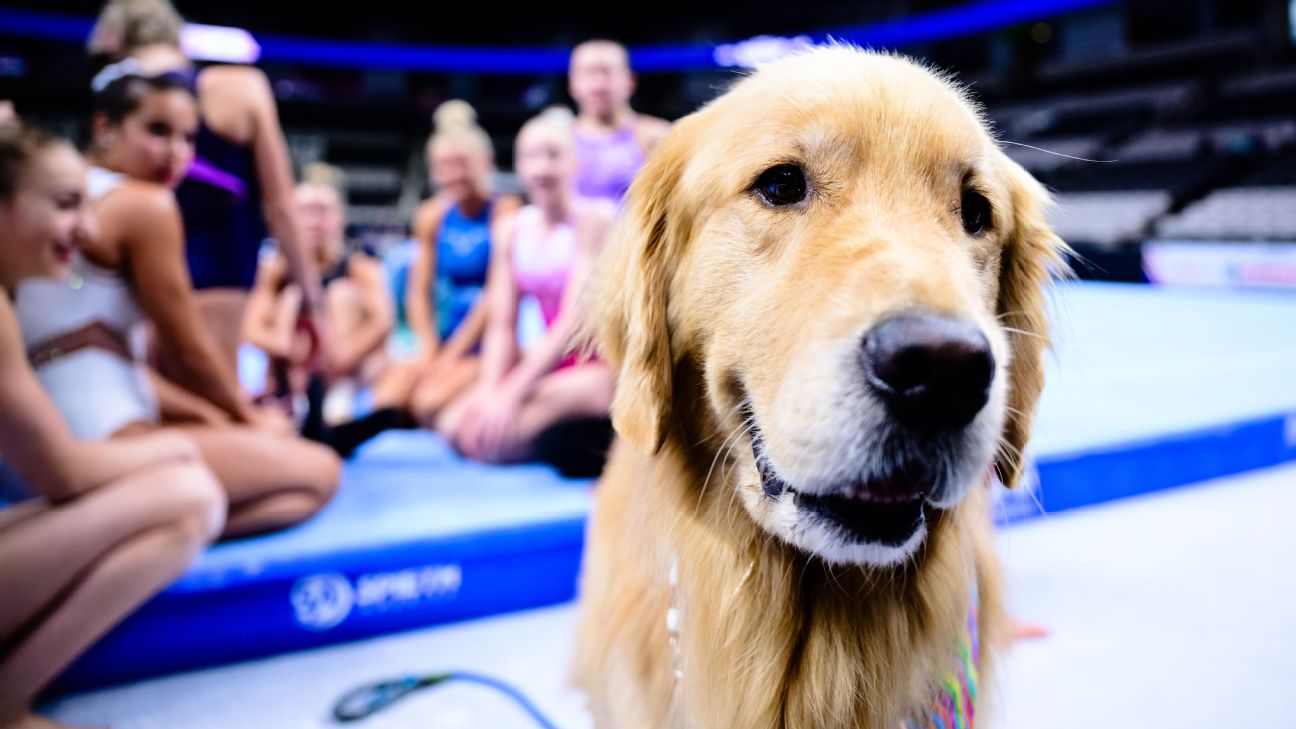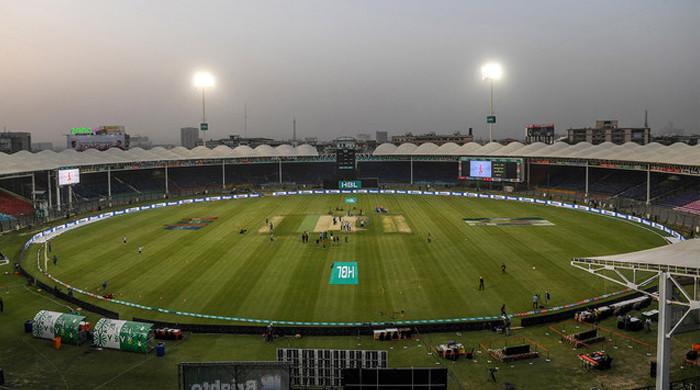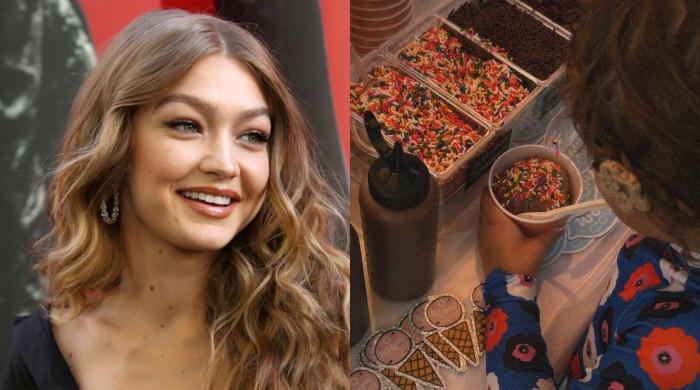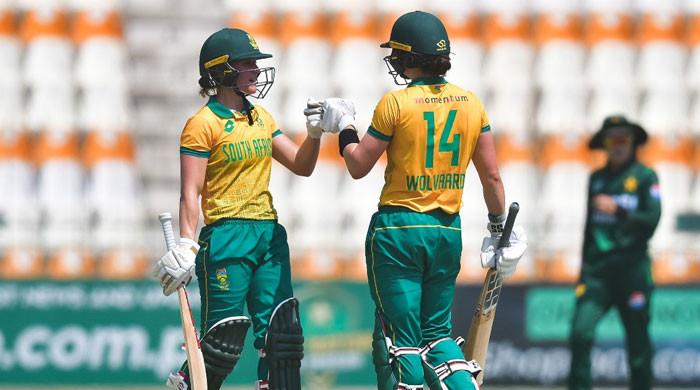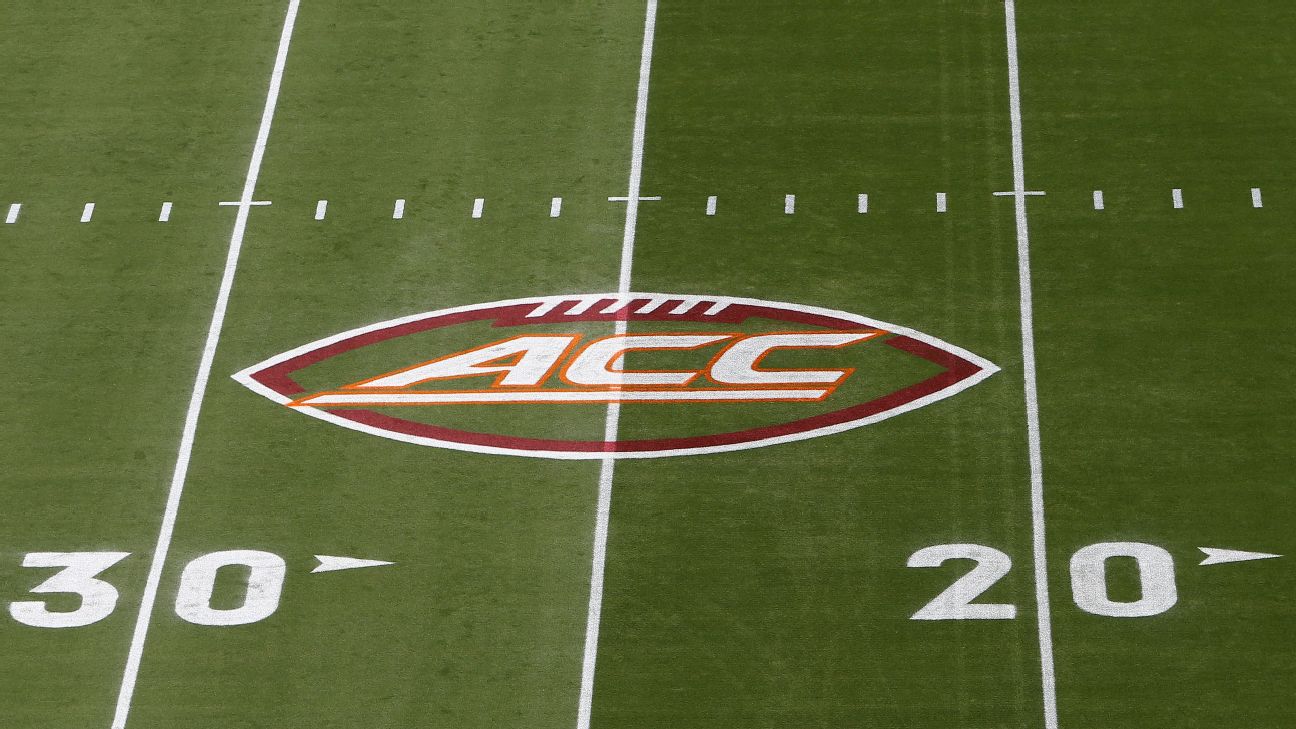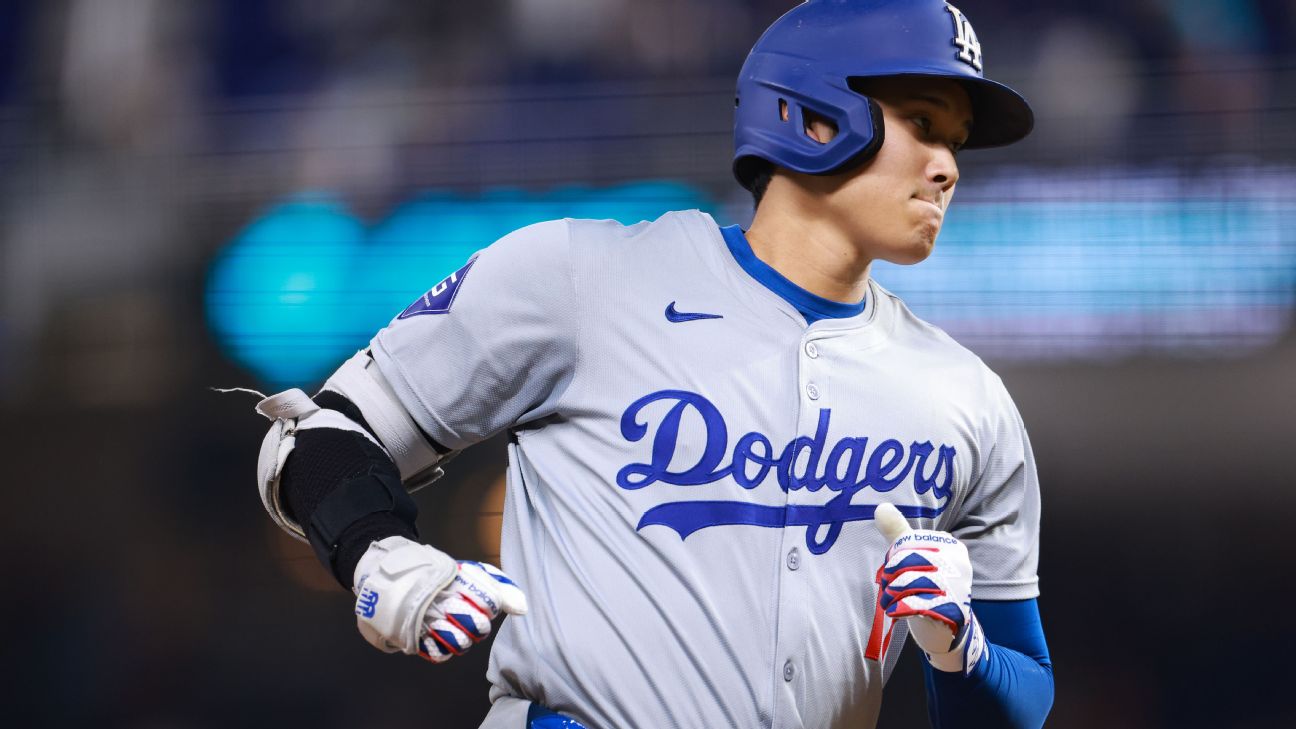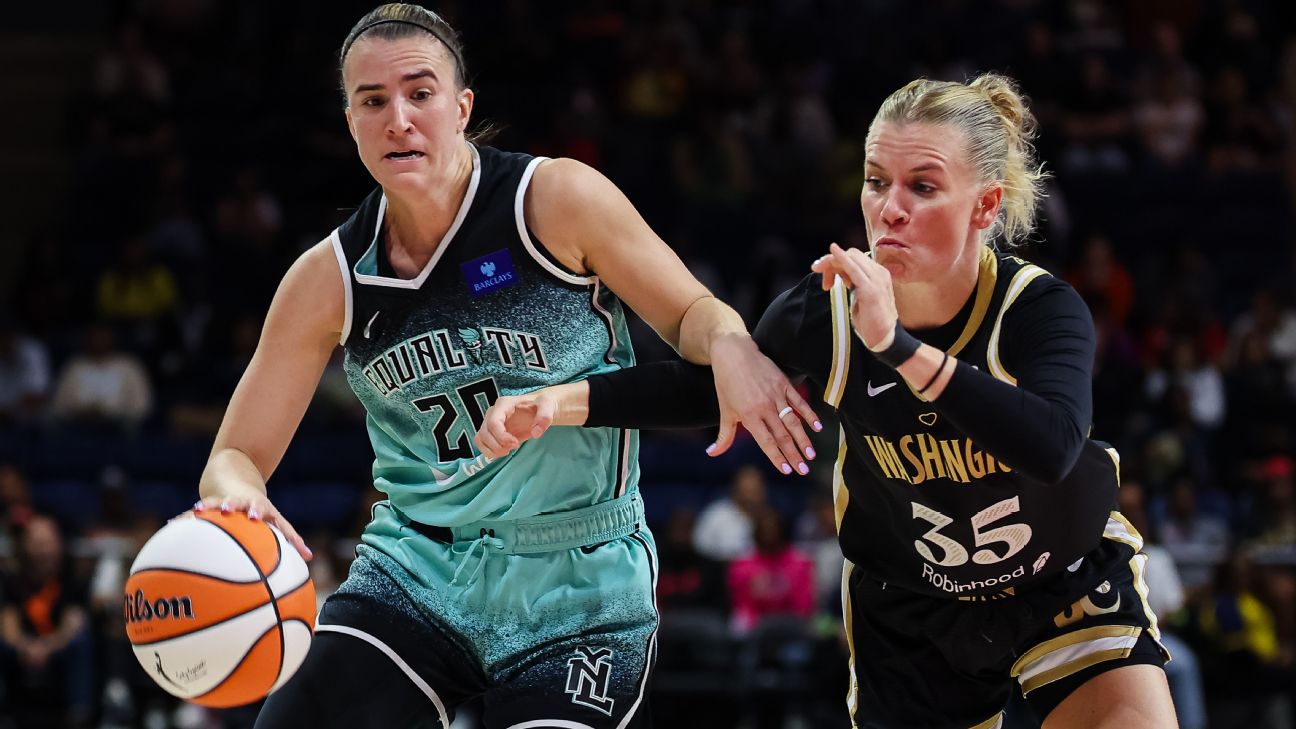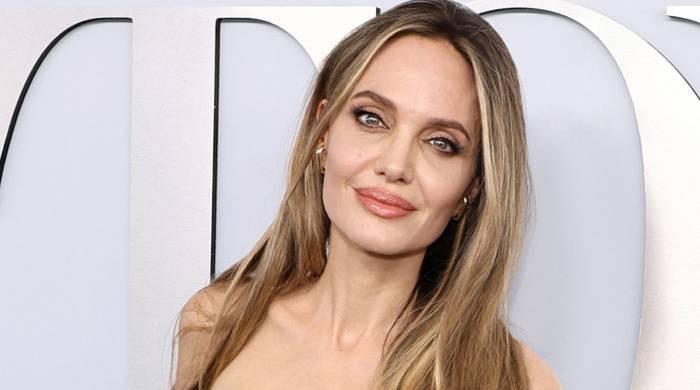MINNEAPOLIS — It’s just past 10 on Friday night and the Target Center, packed to near capacity an hour ago, falls quiet as one of USA Gymnastics’ busiest volunteers makes his way toward an exit. Beacon, a 4-year-old golden retriever, is the organization’s first therapy dog and its only part-time, four-legged staff member. He wears a credential, travels to important meets such as the Olympic trials and holds the title of USAG’s “Goodest Boy.”
Tonight, Beacon is wiped. He has spent a long day comforting athletes and coaches, calming members of the women’s national team before their first night of competition at the Olympic trials, and providing them a belly to rub and gentle face licks after a heart-wrenching meet that saw injuries to two of the country’s top prospects.
“He’s tired now,” Tracey Callahan Molnar, Beacon’s handler and a former gymnast and coach who’s never more than a 5-foot leash away, said. “I think we did important work. It was a rough night for some of the gymnasts, and I think Beacon helped celebrate the good stuff and be there and give support for the challenges.”
Those started before the meet did. Shilese Jones, a two-time world champion who was considered a lock to make the team, was injured during vault warmups. After landing a double-twisting Yurchenko, she grabbed her left knee and was helped out of the arena by her coach, Sarah Korngold, and national team technical lead Chellsie Memmel. She returned to compete on uneven bars and earned the highest score of the night, but scratched from the other events and her status on Sunday is uncertain.
Not long after, Kayla DiCello, a 2021 alternate who has looked as promising as anyone recently, led off the meet on vault. She landed awkwardly, sat down on the mat and shook her head. She left the floor in a wheelchair and in tears and later withdrew from the meet with an Achilles injury.
Around the arena, DiCello’s friends and competitors were shaken. Her roommate here in Minneapolis and one of her best friends, reigning Olympic all-around champion Suni Lee, cried as she lined up to take her first vault. It was a devastating start to an important night for these women who are competing for one of five spots on Team USA.
After the meet, Beacon went to work. He and Callahan Molnar walked out onto the arena floor and spent about 40 minutes with the gymnasts and their coaches, Lee included, who stroked his back, nuzzled his soft fur and, when he could convince them to, rubbed his belly.
“I watch the women and if they’re animated when they see him, I’ll walk toward them,” Callahan Molnar said. “Tonight, some called him over or came to him on their own.” Not every gymnast grew up around dogs, so she is mindful that interacting with Beacon is a new experience for some. Sometimes Beacon directs Callahan Molnar’s attention toward someone with a gentle tug of his leash. He’s drawn to two things: hearing his name and an innate sense of when someone needs him.
“He will turn on a dime without seeing who it is,” Callahan Molnar said. “He picks up on the stress and will pull to that person immediately.” She says therapy dogs like Beacon act as a sort of emotional sponge. “They absorb the stress of the people they’re relieving the stress off of,” she said. “So even though he might be lying still for two hours, he’s wiped out afterwards.”
Which is why right now, Beacon needs a good night’s sleep and his stuffy. He has put in a 15-hour day that started with Callahan Molnar waking him at 7. Here’s a peek into one day in the life of USAG’s most popular employee.
7-11 a.m.: Callahan Molnar doesn’t mean to, but she wakes him when she steps out of bed at 7. The two share a suite at the Hampton Inn with two beds, and Beacon started the night in his own. Now he’s lying in the middle of hers, his head rested on her pillow. “It’s a great way to start the day,” she said. “Hopefully for him, but for sure for me.”
11:30a.m.-1:30 p.m.: Beacon attends his first of two scheduled comfort sessions at USAG’s athlete hotel. Callahan Molnar brings her good boy to a conference room where he waits for gymnasts and coaches to filter in throughout the session. Beacon is part of USAG’s mental health program, a move by the organization to better care for the complete athlete. “Science shows petting a dog, or even watching someone pet a dog, can lower blood pressure and anxiety, help increase the feel-good hormones serotonin and dopamine and lower cortisol levels,” Callahan Molnar said. Cortisol is the body’s main stress hormone. “We all need a certain amount,” she said, “but too much isn’t healthy.”
2-3 p.m.: Beacon takes a much-needed break while Callahan Molnar is interviewed for yet another story about them. He has become quite the celebrity since working his first USAG event, a rhythmic gymnastics elite qualifier in Indianapolis, just over a year ago. “In any other aspect of my life, I would run from the spotlight,” Callahan Molnar said. “But I’m happy to talk about Beacon and pet therapy to anyone who wants to listen. I see myself as his plus-one.”
The two have been together since Beacon, who she named for a bright, guiding light, was a puppy. He was her service animal first, before she trained him in obedience and had him certified as a therapy dog through Pet Partners. At home in Pasadena, California, he volunteers at local hospitals.
3-3:30 p.m.: The moment the pair stands to leave, they’re like magnets. “It is hard to walk from point A to point B with him to find that downtime,” she said. “Everyone wants to say hi, and he wants to say hi to them. It takes 20 minutes to get … not very far.”
3:30 – 5:30 p.m.: Session two at the athlete hotel. As competition nears, Beacon, who is joined by two other therapy dogs, another golden retriever and a Cavalier King Charles spaniel, provides needed distraction for the gymnasts from the stress of trials. In each city, Callahan Molnar, a 40-year employee of USAG, coordinates multiple teams of therapy dogs and handlers to volunteer at the events. Fifteen are working here in Minneapolis, including USA Gymnastics CEO Li Li Leung’s husband, Chris, and Siberian Husky, Suma. During the sessions, it’s not unusual for gymnasts to bring gifts for Beacon: a stuffed bear wearing a shirt with the photo of Beacon and the gymnast on the front, a handmade keychain with his name, a beaded bracelet and a personalized guest book with sweet notes written to him from members of the women’s national team.
5:30-7 p.m.: The duo returns to their hotel to unwind and eat. Callahan Molnar grabbed an extra bagel from the breakfast buffet that is now doubling as her dinner. Beacon finishes the kibble she has fortified with blueberries, raspberries, chopped pumpkin seeds and kefir. He has a big night that starts with a walk back to the arena. When he’s stopped, Callahan Molnar steps back and lets him work and or hands out his cards, which are complete with his Instagram handle, birthdate, likes — swimming and hiking — and dislikes — celery — on the back.
7-9 p.m.: Beacon and Callahan Molnar watch the meet from a room in the Target Center. Before warmups, Leanne Wong gifted him one of her signature handmade hair bows, which he wears for the rest of the night on his harness. He’s learning to interact with mascots such as USAG’s Flip the Cat, but he prefers to spend the hours during competition in the comfort room.
After the competitions on Saturday and Sunday, the men’s and women’s teams will be named, and Beacon will be there for those who need him. Once the selection committee delivers the news of who was selected, he and Callahan Molnar and one other therapy dog team will be available to athletes who are not named to Team USA, and their families. She spent the past week selecting the perfect other pair to accompany them in this duty. “It’s a sensitive situation,” she said. “Their job those nights is a big responsibility.”

 Technology6 مہینے ago
Technology6 مہینے ago
 Pakistan7 مہینے ago
Pakistan7 مہینے ago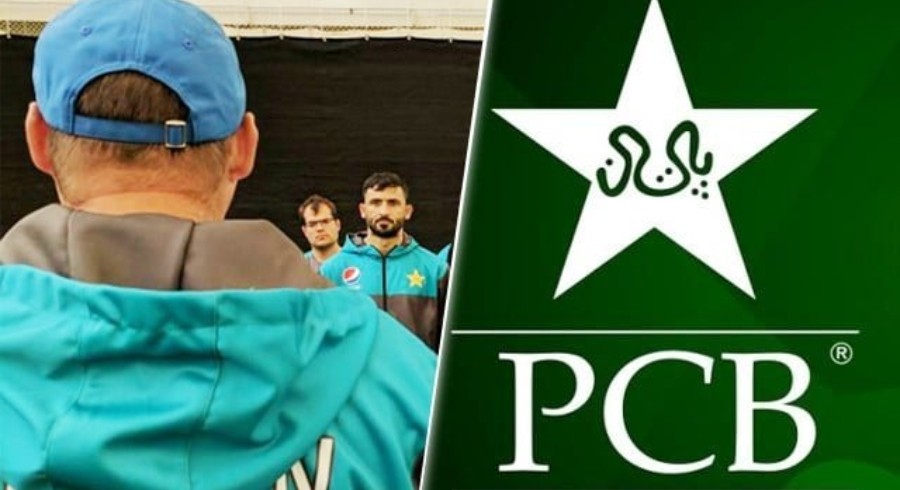
 Sports6 مہینے ago
Sports6 مہینے ago
 Pakistan6 مہینے ago
Pakistan6 مہینے ago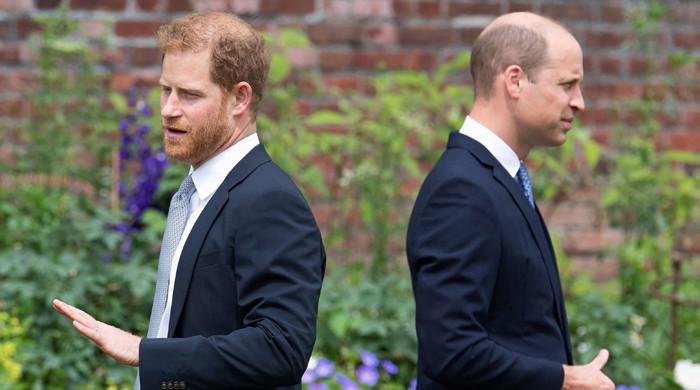
 Entertainment6 مہینے ago
Entertainment6 مہینے ago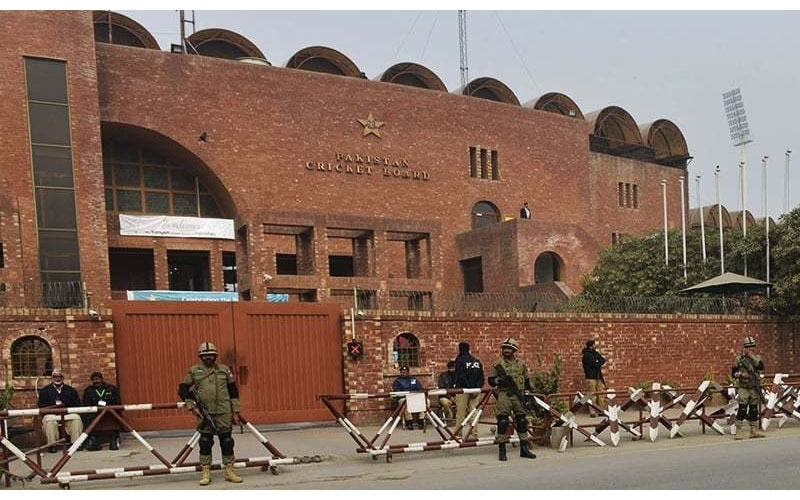
 Sports5 مہینے ago
Sports5 مہینے ago
 Pakistan7 مہینے ago
Pakistan7 مہینے ago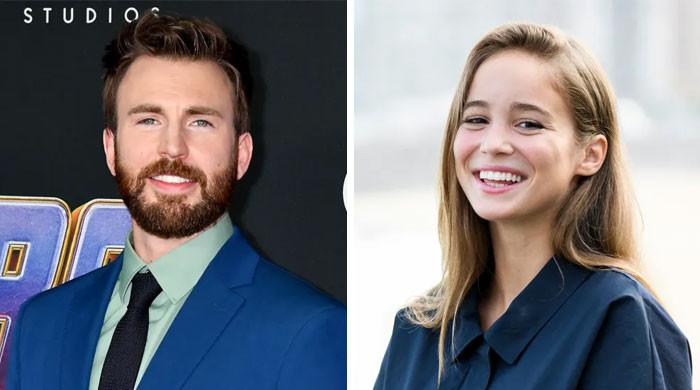
 Entertainment6 مہینے ago
Entertainment6 مہینے ago
